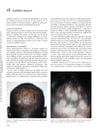 2 citations,
April 2022 in “Clinical, cosmetic and investigational dermatology”
2 citations,
April 2022 in “Clinical, cosmetic and investigational dermatology” A new plant-based treatment was effective for hair regrowth in women with a specific type of hair loss that didn't respond to usual treatments.
 2 citations,
September 2020 in “Dermatologic Surgery”
2 citations,
September 2020 in “Dermatologic Surgery” Hair transplant surgery can cause temporary hair loss in the area where hair was taken from.
 2 citations,
July 2013 in “Veterinary dermatology”
2 citations,
July 2013 in “Veterinary dermatology” Dog skin with hair loss, when transplanted to mice, regrew hair, suggesting the hair loss cause is likely body-wide, not skin-specific.
 1 citations,
February 2022 in “bioRxiv (Cold Spring Harbor Laboratory)”
1 citations,
February 2022 in “bioRxiv (Cold Spring Harbor Laboratory)” A peptide from hair follicle stem cells promotes hair growth by activating specific skin cells.
 1 citations,
January 2013 in “Hair therapy & transplantation”
1 citations,
January 2013 in “Hair therapy & transplantation” The document does not provide information about hair loss treatment.
 May 2024 in “Cell proliferation”
May 2024 in “Cell proliferation” Melatonin helps hair grow by activating a specific signaling pathway.
 January 2021 in “The Ochsner journal”
January 2021 in “The Ochsner journal” ADHD stimulant medications might be linked to a specific type of hair loss called Alopecia Universalis.
 November 2015 in “European Journal of Inflammation”
November 2015 in “European Journal of Inflammation” Cicatricial alopecia, a permanent hair loss condition, is mainly caused by damage to specific hair follicle stem cells and abnormal immune responses, with gene regulator PPAR-y and lipid metabolism disorders playing significant roles.
 April 2012 in “Informa Healthcare eBooks”
April 2012 in “Informa Healthcare eBooks” Syphilitic alopecia is a rare hair loss condition in secondary syphilis that looks similar to another condition but can be diagnosed with specific tests and responds to antibiotics.
 November 2022 in “The journal of investigative dermatology/Journal of investigative dermatology”
November 2022 in “The journal of investigative dermatology/Journal of investigative dermatology” New imaging technology can show up to 40 different markers in hair loss tissue, helping to understand hair disease better.
October 2021 in “Indian Journal of Plastic Surgery” Trichoscopy helps hair transplant surgeons diagnose hair loss types and assess donor hair quality.
 196 citations,
September 2016 in “JCI insight”
196 citations,
September 2016 in “JCI insight” Ruxolitinib effectively regrows hair in most patients with severe hair loss.
 131 citations,
August 2000 in “International Journal of Dermatology”
131 citations,
August 2000 in “International Journal of Dermatology” Inflammation may be linked to hair loss, and targeting specific enzymes could help treat it.
99 citations,
September 2007 in “The American journal of pathology” Chemotherapy damages hair follicles, causing hair loss and other cellular changes.
 64 citations,
June 2014 in “Journal of The American Academy of Dermatology”
64 citations,
June 2014 in “Journal of The American Academy of Dermatology” Researchers found a white halo around hair in most patients with a specific type of hair loss, which helps in early diagnosis and treatment.
42 citations,
July 2017 in “Molecular therapy” A form of vitamin E promotes hair growth by activating a specific skin pathway.
 31 citations,
October 2010 in “Journal of the European Academy of Dermatology and Venereology”
31 citations,
October 2010 in “Journal of the European Academy of Dermatology and Venereology” Some people with heavy hair shedding might actually have a hidden form of alopecia, which can be identified by specific hair changes.
 13 citations,
October 2017 in “Bioscience, Biotechnology, and Biochemistry”
13 citations,
October 2017 in “Bioscience, Biotechnology, and Biochemistry” Centella asiatica extract may help promote hair growth by blocking a specific cell signaling pathway.
11 citations,
June 2019 in “Journal of dermatology” New medicines that block a specific pathway are showing promise for treating severe hair loss but need more testing for safety and effectiveness.
11 citations,
April 2011 in “Biomolecules & Therapeutics” Anionic liposome formulations of finasteride may effectively treat hair loss with fewer side effects.
 7 citations,
January 2017 in “Biological & Pharmaceutical Bulletin”
7 citations,
January 2017 in “Biological & Pharmaceutical Bulletin” Certain compounds from Panax ginseng can block proteins that affect hair growth, potentially helping treat hair loss.
6 citations,
August 2022 in “International journal of molecular sciences” α-Phellandrene may help prevent hair loss by increasing growth factors and cell growth in hair cells through a specific signaling pathway.
 4 citations,
January 2020 in “Skin appendage disorders”
4 citations,
January 2020 in “Skin appendage disorders” A woman with an unusual pattern of hair loss was confirmed to have Frontal Fibrosing Alopecia and treated with specific medications.
 3 citations,
November 1999 in “Journal of Cutaneous Medicine and Surgery”
3 citations,
November 1999 in “Journal of Cutaneous Medicine and Surgery” Examining scalp biopsies in different ways helps better diagnose hair loss types.
 2 citations,
January 2013 in “Hair therapy & transplantation”
2 citations,
January 2013 in “Hair therapy & transplantation” Hair transplants can be a treatment for scarring hair loss if there's good blood flow and no active disease.
 1 citations,
September 2022 in “Journal of dermatological science”
1 citations,
September 2022 in “Journal of dermatological science” Certain vitamins and their derivatives can help hair grow longer by activating specific growth signals.
 February 2024 in “Scientific reports”
February 2024 in “Scientific reports” Four genes are potential markers for hair loss condition alopecia areata, linked to a specific type of cell death.
 September 2022 in “bioRxiv (Cold Spring Harbor Laboratory)”
September 2022 in “bioRxiv (Cold Spring Harbor Laboratory)” The research provided new insights into the genetic factors contributing to hair loss and skin conditions by analyzing individual cells from the human scalp.
January 2022 in “Figshare” Exosomes from dermal papilla cells help hair stem cells grow through a specific signaling pathway.

The document discusses various treatments for different types of hair loss, including steroids, minoxidil, and anthralin.






















